No deal Brexit ‘devastating’ for the Irish environment

March 14th, 2019
The prospect of the UK leaving the EU on March 29th without a deal poses a severe risk to the environment on the island of Ireland. Because this is the shared and common space for all communities on the island, every effort should be made to counter any threat posed to it.
At present, most environmental issues on the island are subject to the same set of common EU standards (the collective regulations known as the EU’s Acquis Communautaire).
If the UK leaves the EU on March 29th without a deal, it would no longer be subject to these common
Businesses in Northern Ireland could be placed at a competitive disadvantage when faced with cheaper imports from outside the EU and seek greater ‘flexibility’ in the implementation of key rules protecting shared species, habitats, and water bodies – with damaging implications for the whole island.
Any dilution of standards in Northern Ireland could see corresponding pressure for dilution south of the border.
At present, the European Commission and the European Court of Justice provide robust oversight and enforcement of EU environmental laws.
A no-deal Brexit would mean the UK would no longer be subject to any of these mechanisms, with insufficient time to put new arrangements in place to replicate their function.
This would be even worse on the island of Ireland as there is currently no independent environment agency in Northern Ireland (unlike in England, Scotland and Wales), and no functioning Northern Ireland executive to put one in place.
This lack of a controlling authority could mean looser implementation of environmental rules and an inability to prevent runaway cross-border pollution.
There are several shared protected nature sites, Natura 2000, on the island of Ireland. These sites are protected by the Birds and Habitats Directives and the Water Framework Directive.
In a no-deal scenario, these sites could be severely undermined without a clear way to continue protection and monitoring. This highlights that protection of endangered species like the hen harrier or whooper swan would also be threatened.

These are only some of the environmental risks posed by a no-deal Brexit. There are a great many more that can be foreseen, but many more it may be hard to predict.
While the Belfast/Good Friday Agreement includes the environment as an area of co-operation with a defined mechanism for doing this, it remains untested.
In the short-term, the risks outlined here are best addressed by avoiding a no-deal Brexit, but in doing so ensuring that the commitments to the environment included in the Withdrawal Agreement like the level playing field are not in any way jeopardised.
In the long-term, the best scenario for the environment with the UK outside the EU is a close relationship based on high standards and effective co-operation.
For the island of Ireland, the only way to guarantee the environment is not
And in the meantime, in anticipation of a no-deal Brexit, the Irish government should not consider by-passing the existing environmental regulations and threaten the very thing we are seeking to defend, the island of Ireland and its communities.
By Mike Walker

Mike is a campaign consultant with over 15 years’ experience working with civil society groups. He contributed to the #NatureAlert campaign to protect the EU’s Birds & Habitat Directives and is advising the Environmental Pillar on Brexit matters.







